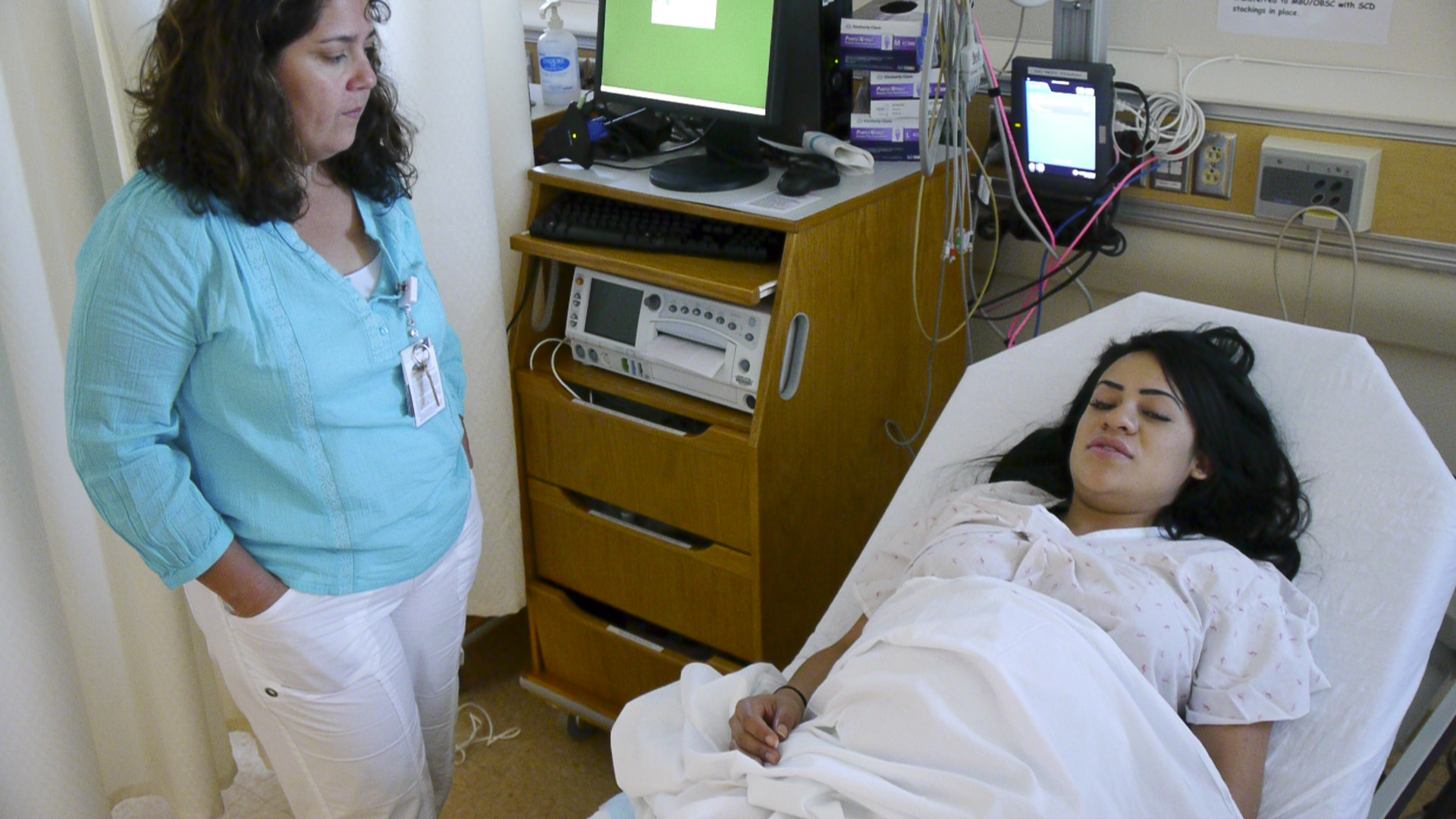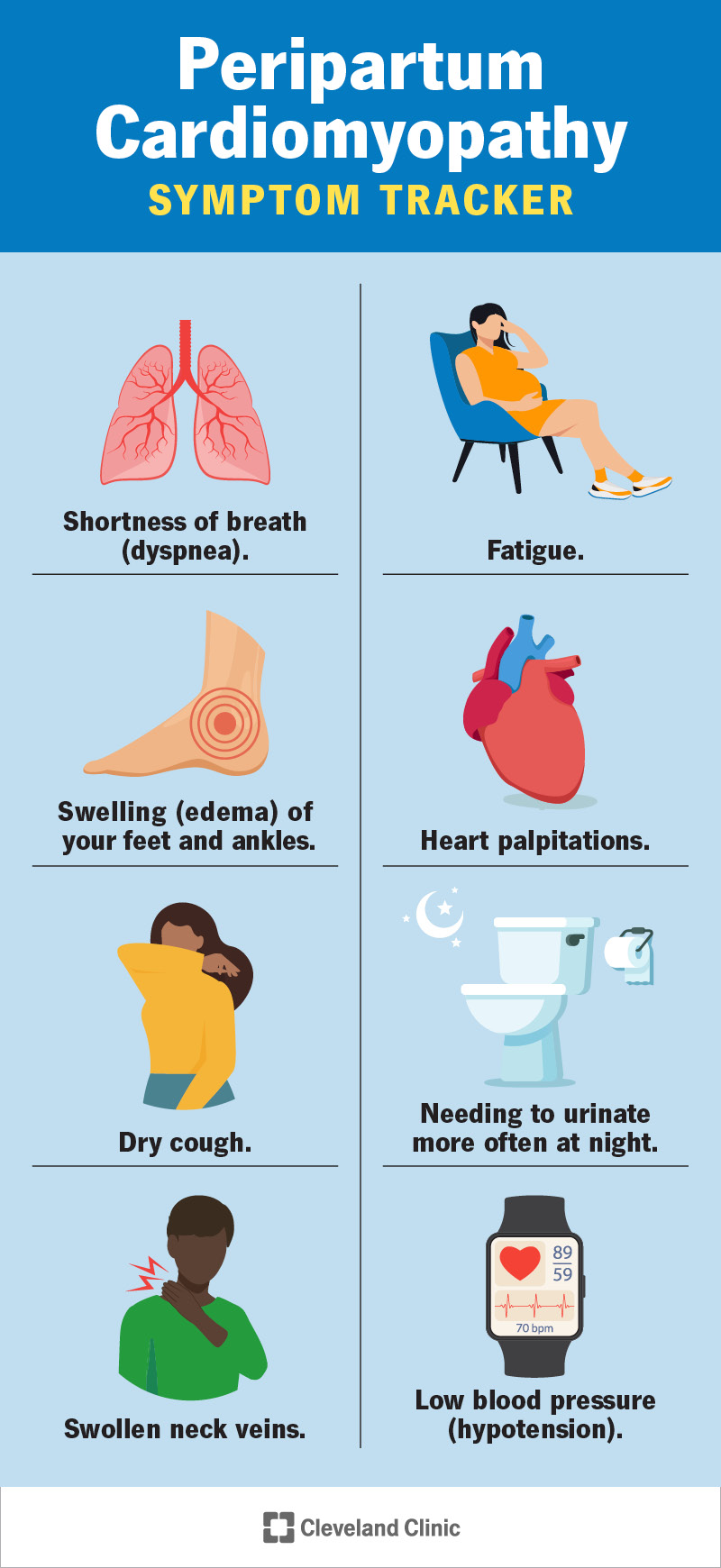Pregnancy can put pressure on your heart, causing symptoms such as chest pain and heart palpitations. The growing uterus pushes against the organs in the chest cavity, which can lead to discomfort.
However, it is important to note that chest pain during pregnancy can also be a sign of a more serious condition, such as a heart attack or preeclampsia, and should be evaluated by a medical professional. Being aware of the potential effects of pregnancy on the heart and seeking medical attention when necessary is crucial for the health and well-being of both the expectant mother and the baby.

Credit: unmhealth.org
Effects Of Pregnancy On The Heart
Pregnancy brings about a multitude of changes in a woman's body, including significant effects on the heart. As the body prepares to nurture and support a growing life, the heart adapts to meet the increased demands placed upon it. Understanding these effects is essential for pregnant women and healthcare providers to ensure optimal maternal and fetal health.
Physical Changes
During pregnancy, a woman's body undergoes various physical changes that can impact the heart. These changes include:
- Increased Blood Volume: The body produces additional blood to nourish the growing fetus, resulting in an approximately 30-50% increase in blood volume. This increased blood volume puts added pressure on the heart, requiring it to work harder to circulate blood efficiently.
- Changes in Hormone Levels: Hormonal fluctuations during pregnancy, particularly increased levels of progesterone, can cause blood vessels to relax and widen. This relaxation, along with the increased blood volume, can lead to a decrease in blood pressure.
- Enlarged Uterus: As the baby grows, the uterus expands, pressing against nearby organs, including the heart and lungs. This pressure can lead to discomfort and shortness of breath, especially in the later stages of pregnancy.
Cardiovascular Impact
The cardiovascular system undergoes significant changes throughout pregnancy to meet the body's increased needs. Some of the notable cardiovascular impacts include:
- Increase in Heart Rate: It is normal for a pregnant woman's heart rate to increase by 10-20 beats per minute compared to her pre-pregnancy rate. This elevated heart rate helps to accommodate the additional blood volume and meet the body's increased metabolic demands.
- Changes in Heart Structure: The heart may undergo structural changes during pregnancy to adapt to the increased workload. The left ventricle, responsible for pumping blood throughout the body, may experience slight thickening of its wall to enhance its pumping efficiency.
- Expansion of Blood Vessels: Blood vessels, particularly those in the uterus, expand during pregnancy to ensure an adequate blood supply to the developing fetus. This expansion contributes to the overall increase in blood volume and can lead to decreased blood pressure.
In conclusion, pregnancy places significant pressure on the heart due to physical changes and cardiovascular impacts. The heart adapts to accommodate increased blood volume, hormone fluctuations, and the physical growth of the uterus. Understanding these effects is crucial for healthcare providers to monitor and address any potential complications associated with cardiac health during pregnancy.
Signs Of Heart Strain During Pregnancy
During pregnancy, the heart experiences increased workload and strain due to the demands of the growing fetus. While it is normal for the heart to work harder during this time, it is essential to be aware of any signs or symptoms of heart strain that may require medical attention. In this section, we'll explore two common signs of heart strain during pregnancy: chest pain and heart palpitations.
Chest Pain
Chest pain can be a common symptom during pregnancy, often caused by heartburn or the pressure exerted by the growing uterus against organs in the chest cavity. While most cases of chest pain are benign, it is crucial to differentiate between normal discomfort and potentially serious conditions, such as a heart attack or preeclampsia, which demand immediate medical attention.
The following are potential causes of chest pain during pregnancy:
- Heartburn: The hormonal changes during pregnancy can cause acid reflux, resulting in a burning sensation in the chest.
- Ligament stretching: As the uterus expands, the ligaments supporting it may stretch, causing discomfort in the chest area.
- Increase in blood volume: Pregnancy leads to an increase in blood volume, which can put pressure on the blood vessels and cause chest pain in some cases.
- Muscle strain: The changes in the body's center of gravity during pregnancy can lead to muscle strain, including in the chest area.
If you experience chest pain during pregnancy, it is essential to consult your healthcare provider to rule out any serious underlying conditions and receive appropriate guidance and treatment.
Heart Palpitations
Heart palpitations, characterized by a racing or irregular heartbeat, are another common sign of heart strain during pregnancy. Increased blood volume and hormonal changes can cause the heart to work harder and beat faster. In most cases, occasional heart palpitations during pregnancy are not a cause for concern, especially if they are not accompanied by other symptoms.
However, if you experience frequent or persistent heart palpitations, it is recommended that you consult your healthcare provider. They can evaluate your symptoms to rule out any underlying cardiac conditions and provide appropriate advice and care.
Remember, your heart may experience increased strain during pregnancy, but it's crucial to pay attention to any unusual or severe symptoms. Regular prenatal check-ups and open communication with your healthcare provider will ensure the well-being of both you and your baby.
Managing Heart Health During Pregnancy
Pregnancy is a miraculous journey that brings immense joy and fulfillment to expectant mothers. However, it also puts extra strain on the body, including the heart. As the body nurtures a growing life within, the cardiovascular system works tirelessly to ensure an adequate blood supply for both mother and baby. This extra demand can sometimes lead to concerns about heart health during pregnancy.
Medical Supervision
During pregnancy, it is crucial to prioritize regular medical supervision to monitor and manage any potential cardiovascular issues. It is recommended to consult with a healthcare professional specializing in maternal health, such as an obstetrician or a primatologist. These professionals will assess your heart health, provide guidance, and closely monitor for any warning signs or complications.
Lifestyle Adjustments
Beyond medical supervision, making certain lifestyle adjustments can play a significant role in managing heart health during pregnancy. Here are some key considerations:
- Maintain a Healthy Diet: Focus on a balanced diet rich in fruits, vegetables, whole grains, and lean proteins. Limit your intake of processed foods, sugary snacks, and saturated fats. Adequate hydration is also essential.
- Stay Physically Active: Engage in low-impact exercises approved by your healthcare provider, such as walking, swimming, or prenatal yoga. Regular physical activity promotes circulation and helps maintain cardiovascular fitness.
- Manage Stress: Pregnancy can be emotionally and physically demanding. Prioritize stress management techniques like deep breathing exercises, meditation, and prenatal yoga to promote overall well-being.
- Get Sufficient Rest: Adequate sleep is vital for the body to recover and maintain optimal heart health. Aim for 7-8 hours of uninterrupted sleep each night, and consider incorporating short naps during the day if needed.
- Avoid Harmful Substances: Stay away from tobacco, alcohol, and recreational drugs, as they can have detrimental effects on heart health and overall pregnancy outcomes.
Note: These lifestyle adjustments should always be discussed with your healthcare provider to ensure they are suitable for your specific health needs and pregnancy condition.
In conclusion, managing heart health during pregnancy requires a multidimensional approach that combines regular medical supervision and lifestyle adjustments. By prioritizing your cardiovascular well-being, you can promote a healthy pregnancy and safeguard both you and your baby's health.

Credit: www.nhlbi.nih.gov
Potential Heart Conditions During Pregnancy
Pregnancy can put pressure on your heart as the body's blood volume increases significantly. This extra strain may exacerbate existing heart conditions and lead to complications. It's essential for pregnant individuals with heart conditions to receive regular medical monitoring and support to ensure a healthy pregnancy.
Pre-existing Conditions
If you already have a pre-existing heart condition, it is important to be aware that pregnancy can put additional strain on your heart. Conditions such as congenital heart disease, arrhythmias, valve disorders, or cardiomyopathy may require close monitoring during pregnancy.
It is crucial to consult with your healthcare provider before planning a pregnancy to ensure that your condition is stable and to discuss any potential risks or necessary precautions. During pregnancy, the increase in blood volume and the demands of the growing fetus can cause your heart to work harder than usual.
This can potentially exacerbate existing heart conditions and lead to complications. Your doctor may recommend regular check-ups, additional monitoring, or specific medications to help manage your condition throughout pregnancy.
Common Complications
Pregnancy can also be associated with certain heart-related complications. These complications can arise even in women with no prior history of heart conditions. It is essential to be aware of these potential complications and seek medical attention if you experience any concerning symptoms during pregnancy.
One common complication is preeclampsia, which is characterized by high blood pressure and damage to organs such as the liver and kidneys. Preeclampsia can put extra strain on the heart and lead to cardiovascular problems if not promptly addressed.
Symptoms of preeclampsia include high blood pressure, swelling in the hands and face, rapid weight gain, headaches, and changes in vision. Another possible complication is gestational hypertension, which is high blood pressure that develops during pregnancy.
While it usually resolves after childbirth, it can still increase the risk of cardiovascular issues during pregnancy. Additionally, heart palpitations or an irregular heartbeat may occur due to the hormonal changes and increased blood volume during pregnancy. Most of the time, these symptoms are harmless, but it is essential to consult your healthcare provider to rule out any underlying heart conditions or potential risks.
It is crucial to maintain open communication with your healthcare provider throughout your pregnancy to monitor and address any potential heart-related concerns. By being proactive and seeking appropriate medical care, you can manage potential complications and ensure a healthy pregnancy for both you and your baby.

Credit: my.clevelandclinic.org
Frequently Asked Questions For Does Pregnancy Put Pressure On Your Heart?
Why Do I Feel Pressure On My Chest While Pregnant?
During pregnancy, the growing uterus can cause pressure on your chest, leading to heartburn or discomfort. However, chest pain may also indicate serious conditions like heart attack or preeclampsia, requiring immediate medical attention.
Is Pregnancy Hard On Your Heart?
Yes, pregnancy can put pressure on your heart, making it work harder due to increased blood volume. This extra strain can exacerbate existing heart conditions. If you experience chest pain or any concerning symptoms, seek immediate medical attention.
Can Pregnancy Put A Strain On Your Heart?
During pregnancy, the heart experiences extra strain due to the increased blood volume necessary to support both the mother and baby. Existing heart conditions may also worsen during pregnancy. It is important to seek medical attention if experiencing chest pain or other heart-related symptoms.
Is It Normal For Your Heart To Feel Heavy During Pregnancy?
During pregnancy, it is normal to feel a heavy sensation in your heart. This is because increased blood volume makes your heart work harder. However, if you experience other symptoms or have an underlying heart condition, it is important to seek medical attention.
Conclusion
Pregnancy can indeed put pressure on your heart. The growing uterus can push against the organs in the chest cavity, causing chest pain and discomfort. While this is often harmless, it is important to be aware that chest pain during pregnancy can indicate more serious conditions like a heart attack or preeclampsia.
If you experience chest pain, it is crucial to seek immediate medical attention. Take care of your heart health during pregnancy and consult with your healthcare provider for any concerns.







0 Comments